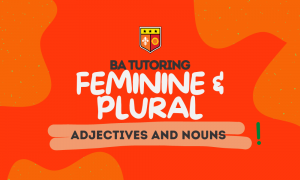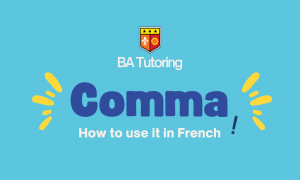List of the Most Common Verbs in French
There are more than 8000 different verbs in French. Some of them are words that even native speakers have never heard of. Good news! You don’t need to learn all of them to be able to function in a French environment. You can start by learning the most commonly used verbs.
1. Être (to be)
Présent | |
Je (I) | suis |
Tu (you) | es |
Il/elle/on (He/she/ it/ we) | est |
Nous (we) | sommes |
Vous (you) | êtes |
Ils/elles (they) | sont |
Ex: Je suis heureuse. I am happy.
The verb être is also used as an auxiliary verb in the formation of passé composé.
Ex: Je suis allé à la plage. I went to the beach.
2. Avoir (to have)
Présent | |
J’ (I) | ai |
Tu (you) | as |
Il/elle/on (He/she/ it/ we) | a |
Nous (we) | avons |
Vous (you) | avez |
Ils/elles (they) | ont |
Ex: J’ai un chien. I have a dog.
The verb avoir is also used as an auxiliary verb in the formation of passé composé.
Ex: J’ai mangé I ate
3. Aller (to go)
Présent | |
Je (I) | vais |
Tu (you) | vas |
Il/elle/on (He/she/ it/ we) | va |
Nous (we) | allons |
Vous (you) | allez |
Ils/elles (they) | vont |
Ex: Je vais à la plage. I go to the beach.
The verb aller is also used as an auxiliary verb in the formation of futur proche.
Ex: Je vais manger. I am going to eat.
(Note that the second verb is always in the infinitive form.)
4 and 5.
Pouvoir (to be able to)
Vouloir (to want)
Both pouvoir and vouloir have the same endings in the present tense.
Présent | |
Je (I) | peux/ veux |
Tu (you) | peux /veux |
Il/elle/on (He/she/ it/ we) | peut/veut |
Nous (we) | pouvons/voulons |
Vous (you) | pouvez/voulez |
Ils/elles (they) | peuvent/ veulent |
Ex: Je peux nager. I can swim.
Ex: Nous voulons sortir de la maison. We want to leave the house.
(note that the verb following pouvoir and vouloir is always in the infinitive form)
6. Faire (to do/make)
Présent | |
Je (I) | fais |
Tu (you) | fais |
Il/elle/on (He/she/ it/ we) | fait |
Nous (we) | faisons |
Vous (you) | faites |
Ils/elles (they) | font |
Ex: Ils font leurs devoirs. They do their homework.
7. Venir (to come)
Présent | |
Je (I) | viens |
Tu (you) | viens |
Il/elle/on (He/she/ it/ we) | vient |
Nous (we) | venons |
Vous (you) | venez |
Ils/elles (they) | viennent |
Ex: Mes amis viennent à la maison. My friends come to the house.
8. Savoir (to know)
Présent | |
Je (I) | sais |
Tu (you) | sais |
Il/elle/on (He/she/ it/ we) | sait |
Nous (we) | savons |
Vous (you) | savez |
Ils/elles (they) | savent |
Ex: Nous savons cuisiner. We know how to cook.
9-18.
Parler (to talk)
Demander (to ask),
Trouver (to find)
Manger ( to eat)
Rester (to stay)
Porter (to wear)
Montrer (to show)
Penser (to think)
Passer (to pass)
Commencer (to start)
To conjugate all the verbs of the first group you only have to replace the -er by the following endings.
Présent | |
Je (I) | -e |
Tu (you) | -es |
Il/elle/on (He/she/ it/ we) | -e |
Nous (we) | -ons |
Vous (you) | -ez |
Ils/elles (they) | -ent |
Ex: Nous mangeons du chocolat. We eat chocolate.
(Note that manger takes an -e before the -ons and commencer takes a -ç before the -ons at the 1st person plural to keep the appropriate pronunciation.)
19. Devoir ( to need to)
Présent | |
Je (I) | dois |
Tu (you) | dois |
Il/elle/on (He/she/ it/ we) | doit |
Nous (we) | devons |
Vous (you) | devez |
Ils/elles (they) | doivent |
Ex: Nous devons étudier le français. We need to study French.
20. Mettre (to put)
Présent | |
Je (I) | mets |
Tu (you) | mets |
Il/elle/on (He/she/ it/ we) | met |
Nous (we) | mettons |
Vous (you) | mettez |
Ils/elles (they) | mettent |
Ex:Tu mets tes souliers. You put on your shoes.
21. Sortir (to leave/ take out)
Présent | |
Je (I) | sors |
Tu (you) | sors |
Il/elle/on (He/she/ it/ we) | sort |
Nous (we) | sortons |
Vous (you) | sortez |
Ils/elles (they) | sortent |
Ex: Je sors les vidanges. I take out the garbage.
22. Dire (to say)
Présent | |
Je (I) | dis |
Tu (you) | dis |
Il/elle/on (He/she/ it/ we) | dit |
Nous (we) | disons |
Vous (you) | disez |
Ils/elles (they) | disent |
Ex: Elle dit la vérité. She says the truth.
23. Voir (to see)
Présent | |
Je (I) | vois |
Tu (you) | vois |
Il/elle/on (He/she/ it/ we) | voit |
Nous (we) | voyons |
Vous (you) | voyez |
Ils/elles (they) | voient |
Ex: Vous voyez des fantômes. You see ghosts.
23. Voir (to see)
Présent | |
Je (I) | vois |
Tu (you) | vois |
Il/elle/on (He/she/ it/ we) | voit |
Nous (we) | voyons |
Vous (you) | voyez |
Ils/elles (they) | voient |
Ex: Vous voyez des fantômes. You see ghosts.
24. Prendre (to take)
Présent | |
Je (I) | prends |
Tu (you) | prends |
Il/elle/on (He/she/ it/ we) | prend |
Nous (we) | prenons |
Vous (you) | prenez |
Ils/elles (they) | prennent |
Ex: Je prends un café. I take a coffee.
25. Entendre (to hear)
Présent | |
J’(I) | entends |
Tu (you) | entends |
Il/elle/on (He/she/ it/ we) | entend |
Nous (we) | entendons |
Vous (you) | entendez |
Ils/elles (they) | entendent |
Ex:Vous entendez les oiseaux chanter. You hear the birds singing.
Free Printable Practice Worksheets: French Verb Conjugation
Now that you have learned about some of the most commonly used verbs in French, it is time to test your knowledge with the following worksheets!




